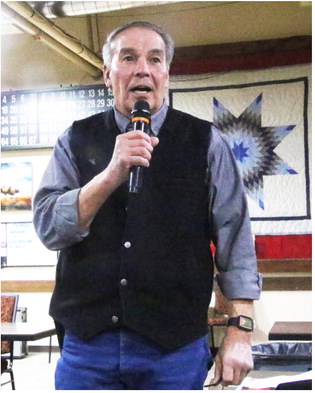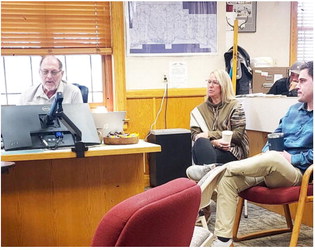TikTok Files Suit Against State Of Montana
In a court filing that chronicles how it stores data and protects minors, TikTok has responded to Montana’s firstof- its-kind ban on the social media app, which was signed into law earlier this month by Montana Gov. Greg Gianforte.
TikTok Inc., is suing the State of Montana to strike the recently passed law, alleging a number of constitutional violations and maintaining that Montana Attorney General Austin Knudsen, Gianforte and lawmakers have unfairly targeted the company, plastering it with unfounded concerns that risk not only its own viability but the ability of thousands of Treasure State residents to interact with its communities.
The lawsuit was filed in federal court in Missoula and has been assigned to Judge Dana L. Christensen. It is the second lawsuit filed challenging the law. The first was filed by five state residents who allege the ban is an unconstitutional infringements on their rights.
“The state has enacted these extraordinary and unprecedented measures based on nothing more than unfounded speculation,” the lawsuit said. “Yet the state cites nothing to support these allegations, and the state’s bare speculation ignores the reality that (TikTok) has not shared, and would not share, U.S. user data with the Chinese government, and has taken substantial measures to protect the privacy and security of TikTok users, including by storing all U.S. user data by default in the United States and by erecting safeguards to protect U.S. data.”
However, Knudsen in a press release about TikTok instead argues that TikTok and its parent company, ByteDance, are tools for the Communist Party of China and being used to spy on residents through data collection.
“We know that the Chinese Communist Party is using it to spy on Americans by collecting personal information, keystrokes, and even the locations of its users,” Knudsen said. “Additionally, the app is feeding harmful adult content to children that encourages illegal and dangerous behavior.”
Senate Bill 419, which was sponsored by Sen. Shelley Vance, R-Belgrade, was drafted in part by Knudsen’s office and targets TikTok specifically, even while there were attempts by the legislature to broaden it. It imposes a $10,000 violation for every company that allows either a download of its app or access to TikTok’s content.
The 62-page lawsuit outlines the four different areas of constitutional law that it claims the Montana ban violates, including the First Amendment, federal pre-emption, the commerce clause and a ban on bills of attainder, which prohibit the government or states from specifically targeting a specific group for punishment.
Safety and ownership
While much of the legal argument forwarded by TikTok centered on the U.S. Constitution, the heart of the document was an outline of how the social media company said it has safeguarded users’ data and protected minors, despite allegations of state and federal officials.
TikTok pointed out that it has spent more than $1.5 billion to separate and protect American-user data in Texas, in a project overseen by third-party technology company, Oracle. Oracle is also the company that made Gianforte a multi-millionaire when he sold his Bozeman- based RightNow Technologies to it. TikTok counts nearly 7,000 U.S. employees and has more than 150 million active U.S. users and a billion users worldwide.
It defended the users and the communities on TikTok, pointing to those that support each other, like ones created for recovering alcoholics to those with rare medical conditions or those caring for loved ones with dementia.
In the suit, it spotlights a Montana user, @bigskycaroline, who has nearly 100,000 followers who watch her experiences caring for sheep and other animals on her ranch. She has received more than 1.2 million likes.
On a larger scale, the social media company says it fosters a love of reading and books by its #BookTok community where viewers celebrate books and videos associated with it have been viewed more than 100 billion times.
#Christiantiktok is a faith community that has tallied more than 40 billion user views, it said.
In the filing, TikTok said it collects information from its U.S. users including username, which does not have to be matched to an actual name, date of birth, phone number or email address. It does not require real names, employment or relationship status.
“Current versions of the TikTok app do not collect precise or approximate GPS information from U.S. users,” it said.
It also said that it has created a U.S. data security division that oversees protecting U.S. user data.
“TikTok currently routes 100% of its U.S. user traffic to Oracle and (TikTok Data Security)- controlled infrastructure in the U.S.,” the lawsuit said. ‘Oracle has begun inspecting TikTok’s source code, which will ultimately serve to identify instances of potential malicious code or security vulnerabilities. No other social media company or entertainment platform provides this type of access and transparency to third-party entities.”
The lawsuit directly rebuts charges that the company is handing over data to the Chinese government or communist party.
“(TikTok) has never shared, or received a request to share, U.S. user data with the Chinese government. Nor would plaintiff honor such a request if one were ever made,” the lawsuit said.
The lawsuit also takes a dive into the user guidelines, including the practices surrounding minors, which both lawmakers and Knudsen have voiced concern about.
The community guidelines of TikTok ban nudity, sexual activity, exploitative content and sexually explicit material. It reports that in the fourth quarter of 2022, 96.2% of the content flagged as violating the standards was removed before any report by users. In 91%, the removal occurred within 24 hours, and in 85% of the cases, the removal happened before the video received any views, according to the court filing.
“TikTok screens content for signs of potential predatory or abusive behavior,” it said. “TikTok’s moderation system is automated to identify content, including videos, captions and comments that violate TikTok’s Youth Safety and Wellbeing policy.”
The suit also outlines what practices TikTok employs for users who are younger than 13 years old, including videos that are vetted by a third-party expert, Common Sense Networks. For users between the ages of 13 and 16, TikTok settings default to private, and those accounts cannot send direct messages.
“TikTok also prevents teens from receiving latenight push notifications and gives parents and guardians the ability to create further restrictions on notifications. Another safety feature is that users under 18 cannot host LIVE,” the filing said. “Tik-Tok’s parental control feature, Family Pairing, allows a parent to link their TikTok account to their child’s account and set certain parent controls.”
In March, TikTok also announced that every account belonging to a person under the age of 18 will have a 60-minute daily screen time limit. If a teen exceeds that, he or she will have to enter a passcode, which will allow them to watch longer. For those under 13, 60 minutes will be the maximum unless allowed by a parent.
TIkTok also argues that the data it collects is no different than those being collected by other apps. Furthermore, the data that is available to Tik-Tok is also available to private firms and other groups through data brokers, which harvest and sell data from the apps.
Damage to users TikTok
The lawsuit argues that it wouldn’t just be Montana residents who would be harmed by the new law, set to go into effect on Jan. 1, 2024. It would also harm the rest of the country and world because Montana would essentially be cut off from interaction. Moreover, Montana markets and businesses would be silenced.
Attorneys for the social media company also say that because of the $10,000 fine and Knudsen’s pledge to enforce every action, that may lead other companies that make the TikTok app available for download discontinue carrying it to avoid any possible violation.
“The ban will mean that TikTok will no longer be available in Montana, resulting in the loss of many thousands of current and future users. Competitors will undoubtedly benefit as TikTok creators and users in Montana switch platforms,” it said. “And even if the ban were lifted after a period of weeks or months, the harm to TikTok’s user base and plaintiff’s competitive position in Montana would be permanent.”
Constitutional violation
Attorneys for TikTok argue that in addition to suppressing the First Amendment by exercising control on content, speech and freedom of association, it also violates a number of other provisions.
The lawsuit said that in order for the state to succeed on its claim that it must ban the social media app, it must both demonstrate a danger and then narrowly craft the restrictions, something it accused the state, lawmakers and leaders of failing to do.
“The purported national security concerns animating the TikTok ban are outside the state’s realm of expertise and constitutional authority,” the lawsuit said. “And the state has failed entirely to substantiate the assertion that TikTok is harmful to minors or that TikTok is more dangerous than the many other online entertainment, communications, and social- media services that the TikTok ban does not touch.”
The court filing namechecks Knudsen, pointing to statements the attorney general made: “Frankly the Chinese did us a favor by floating that spy balloon over Montana when they did.”
Rep. Ed Butcher, R-Winifred, was also cited because he used the same spy balloon incident as justification to ban TikTok, saying “They’re the ones that started this thing.”



